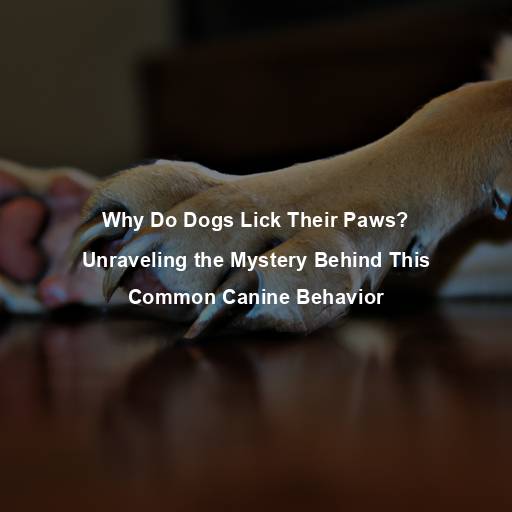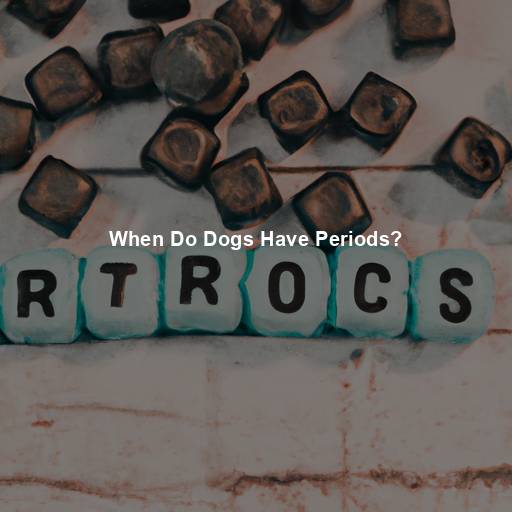Why Do Dogs Lick Their Paws? Unraveling the Mystery Behind This Common Canine Behavior
Last Updated on November 12, 2023 by Evan
Contents
- 1 Understanding the Curious Habit of Paw Licking
- 2 Debunking Common Misconceptions
- 3 Tips to Manage Excessive Paw Licking
- 4 Addressing Excessive Paw Licking Through Behavioral Modifications
- 5 When to Seek Veterinary Assistance
- 6 Promoting Paw Health and Overall Well-being
- 7 The Importance of Patience and Understanding
- 8 FAQs – Why do dogs lick their paws?
Understanding the Curious Habit of Paw Licking
There’s something captivating about dogs and their enigmatic ways. Among the multitude of curious behaviors they exhibit, one that piques our interest is the act of dogs licking their paws. Although it may appear innocent and instinctual, we find ourselves puzzling over the deeper significance it holds. Brace yourselves as we embark on a journey through the intricate realm of canine psychology, unearthing the secrets behind this seemingly simple yet mystifying behavior.
Seeking Comfort and Relaxation
It’s astonishing how pets find solace in the simplest of gestures. Take dogs, for example. When they’re feeling overwhelmed or out of sorts, they resort to licking their paws. Just like how we humans nibble our nails or twirl our hair, dogs use this rhythmic motion to ease their anxiety and snatch a moment of tranquility.
Maintaining Personal Hygiene
Dogs have an incredible knack for cleanliness, and their diligent paw licking ritual is a testament to their innate grooming instincts. Through this quirky behavior, our furry companions effortlessly rid their paws of pesky dirt, debris, and other mysterious particles that inevitably latch onto them during their thrilling expeditions outdoors. Moreover, this curious habit also serves a crucial purpose of maintaining optimal paw hydration, ensuring that their adorable little paws remain supple, unblemished, and shielded from the menace of becoming painfully dry or cracked.
Addressing Skin Irritations and Allergies
Sometimes, dogs lick their paws excessively as a response to skin irritations or allergies. Just like humans, dogs can experience itchiness and discomfort due to various factors, such as environmental allergens, food sensitivities, or insect bites. By licking their paws, dogs attempt to alleviate the itching sensation and provide temporary relief.
Manifestation of Boredom or Anxiety
Dogs are social animals, and when they feel bored or anxious, they may resort to behaviors that help them cope with these emotions. Excessive paw licking can be a manifestation of boredom or anxiety in dogs. It serves as a self-soothing mechanism to distract them from their underlying feelings of restlessness or unease.
Potential Medical Issues
While occasional paw licking is considered normal, persistent and excessive licking can indicate an underlying medical issue. Dogs may lick their paws excessively due to conditions such as fungal or bacterial infections, parasites, or even pain. If you notice your dog excessively licking their paws and it becomes a chronic behavior, it is essential to consult a veterinarian to rule out any potential health concerns.
Debunking Common Misconceptions
Dog owners often find themselves perplexed by the behavior of their furry friends when it comes to excessive paw licking. However, it’s time to shed light on the burst of misconceptions surrounding this perplexing canine habit. By debunking these commonly held myths, we can unravel the truth behind why dogs engage in this intriguing behavior and gain a clearer understanding of their paw-centric antics.
Dogs Only Lick Their Paws When They’re Dirty
Paw licking is a natural behavior that dogs employ to keep their paws tidy, but there is a plethora of factors that can contribute to this habit, as we have already explored. However, it is crucial to bear in mind that if your furry friend engages in excessive and prolonged paw licking, it might be an indication of an underlying concern that necessitates prompt investigation and care. Stay attuned to your pup’s needs and embark on a journey to decipher the perplexity behind their paw licking.
Paw Licking is Always Harmless
When it comes to our furry friends, it’s natural for them to take a moment to nibble on their paws every now and then. But, did you know that this innocent act can unexpectedly take a turn for the worse? Yes, it’s true! Excessive paw licking can pave the way for a whole host of issues, from pesky skin irritations to stubborn infections and even the dreaded hot spots.
Punishing Dogs for Paw Licking is Effective
Disciplining a dog for indulging in the perplexing habit of licking their paws can be an exercise in futility. These furry creatures operate on a different wavelength than us humans, making punishment a befuddling concept for them. In fact, it might just unleash a cascade of confusion, anxiety, and heightened stress levels in these sensitive souls. Focus on unraveling the enigma behind their paw-licking compulsion, offering them tailored solutions and engaging diversions to ensure their well-being.
Tips to Manage Excessive Paw Licking
Is your furry friend’s incessant paw licking causing you concern? Fret not, for we have compiled a variety of practical and effective measures to help you combat this perplexing behavior. From simple remedies like keeping their paws clean and dry, to more advanced techniques such as behavioral training and consulting with a veterinarian, we’ve got you covered. Get ready to bid farewell to those pesky paw-licking sessions and restore peace to your dog’s life!
- Regular Paw Checks: Regularly inspect your dog’s paws for any signs of irritation, injury, or foreign objects. Keeping their paws clean and free from debris can reduce the need for excessive licking.
Is your furry friend constantly licking their paws, driving you crazy? Well, fret not! We’ve got you covered with a fascinating solution for those paw-related allergies. Collaborate with your trusted veterinarian to uncover the mysterious allergens behind this perplexing behavior and develop a fail-proof plan to manage them.
Finding ways to keep your furry friend entertained and content can be a challenge, but it’s crucial for their well-being. Explore various activities that provide both mental and physical stimulation to help combat any feelings of restlessness or stress. Whether it’s engaging in interactive play sessions, offering puzzle toys, or considering obedience training, finding what works best for your dog will keep them focused and energized.
Ensuring the overall health and well-being of our beloved canine companions is of paramount importance. That’s why regular visits to the veterinarian are essential in keeping our furry friends in top shape. However, if you find yourself perplexed by your dog’s persistent paw licking, despite all your valiant efforts, it might be wise to seek professional guidance from a veterinarian to rule out any underlying medical conditions. Embrace the burst of peace of mind that comes with expert advice and let your pup’s paw-related enigma be solved!
Climate and Seasonal Factors
The climate and seasonal changes can have an impact on a dog’s paw health and, consequently, their licking behavior. For example, during the winter months, the cold weather and exposure to ice-melting chemicals can cause dryness and irritation in their paws. In response, dogs may lick their paws more frequently to alleviate discomfort. Similarly, in hot and humid climates, dogs may lick their paws to cool them down or relieve itchiness caused by heat-related allergies.
Environmental Allergens
It’s fascinating how the furry companions of ours, dogs, can also experience sensitivity towards various environmental allergens that we humans encounter, like pollen, grass, mold, or even those pesky dust mites. These allergens can be quite mischievous, causing our fur babies to engage in the seemingly mysterious ritual of incessant paw licking, as if striving to find solace for their irritated skin. However, fret not, as there is hope in this perplexing situation – by pinpointing and minimizing their exposure to these allergens, we can potentially alleviate the intensity of these enigmatic paw licking episodes.
Stress and Anxiety Triggers
Stress and anxiety can contribute to excessive paw licking in dogs. Changes in their environment, routine, or social dynamics can cause emotional distress, leading to increased licking behaviors. Separation anxiety, fear of loud noises, or the presence of new pets or people in the household are common stressors that can trigger paw licking. Implementing stress-reducing techniques, such as providing a safe and comfortable space, practicing positive reinforcement training, or using calming aids, can help alleviate their anxiety and reduce paw licking.
Addressing Excessive Paw Licking Through Behavioral Modifications
Positive Reinforcement Training
When it comes to addressing the seemingly endless cycle of paw licking, incorporating positive reinforcement techniques may just hold the key to success. By showering our furry friends with rewards for exhibiting desirable behaviors and engaging them in activities that stimulate their minds, we can help them break free from the clutches of this perplexing habit. So, why not embark on this journey of reconditioning and watch as your dog discovers a world of paw-licking-free bliss?
Distraction Techniques
Looking for ways to keep your furry friend from incessantly licking their paws? We’ve got some intriguing solutions that will surely pique your interest. From interactive toys that will occupy their minds for hours to chew bones that will give them something productive to gnaw on, you’ll find the perfect distraction for your paw-obsessed pup. And don’t forget, incorporating regular physical exercise and playful play sessions can work wonders in reducing their stress and anxiety levels, ensuring those paws stay pearly clean.
Environmental Enrichment
Creating a stimulating and enriching environment for dogs can help alleviate boredom and reduce paw licking behaviors. Offer a variety of toys, rotate them regularly, and provide interactive activities that encourage mental engagement. Additionally, ensuring daily exercise and playtime can help release excess energy and promote overall well-being.
When to Seek Veterinary Assistance
Excessive paw licking, though a common occurrence now and then, takes a baffling turn when it becomes a persistent habit that refuses to be ignored. Such perplexing behavior, my dear reader, might just be a silent cry for help from our furry friends, signaling an underlying health issue they can’t simply lick away. So, be on the beat and keep a keen eye for additional telltale signs, because in the strange dance of paw licking, seeking veterinary assistance might just be the key to unraveling the enigma.
- Redness, swelling, or discharge from the paws
Do you ever find yourself struggling to walk or experiencing a persistent limp that just won’t seem to go away? It can be incredibly perplexing and downright frustrating when our bodies don’t function the way we want them to. If you’re facing these mobility challenges, seek professional help to address the burstiness in your gait and discover the root cause of your discomfort. Remember, it’s always better to take action and seek assistance than to let these issues persist.
Are you constantly finding clumps of hair on your floors or noticing strange, mysterious skin lesions on your furry friend’s paws? Don’t fret! We’ve got the inside scoop on these perplexing issues that have been puzzling pet owners everywhere. Discover the bizarre truth behind hair loss and those mysterious skin lesions, so you can finally find the answers you’ve been searching for.
One of the most perplexing and unpredictable phenomena that we as humans experience is the enigmatic relationship between our appetites and weight. It seems that at times, our desires for certain indulgences can fluctuate at the drop of a hat, leading to unexpected shifts in our waistlines. This constant state of burstiness leaves us in a perpetual state of wonderment, always questioning what our next meal will bring and how it will impact our physical appearance. Whether it be an unanticipated loss of appetite leading to weight loss, or a sudden surge of cravings resulting in weight gain, the intricate dance between our taste buds and our bodies never ceases to astonish us. - Behavioral changes such as aggression, withdrawal, or restlessness
When it comes to the health and well-being of your beloved pet, it’s imperative to seek the expertise of a qualified veterinarian. They possess the necessary skills to conduct a comprehensive examination, administer crucial tests, and ultimately deliver an accurate diagnosis and tailored treatment plan for your furry companion. Entrusting your pet’s care to a professional not only ensures peace of mind, but also guarantees they receive the best possible care in a perplexing situation.
Promoting Paw Health and Overall Well-being
Taking a proactive approach to promote paw health and well-being can greatly contribute to minimizing excessive paw licking. Here are some additional tips to keep in mind:
- Regularly trim your dog’s nails to prevent overgrowth, which can lead to discomfort and paw licking.
After strolling down the neighborhood with your beloved pooch, don’t forget to give their paws some tender love and care. Eliminate any lurking irritants or allergens by giving them a thorough cleanse. By diligently wiping away the remnants of their explorations, you’ll help keep their paws healthy, happy, and free from any potential discomfort.
Treat your furry friends to some much-needed TLC by pampering their precious paws with pet-friendly moisturizers or delicate paw balms. Give their little paws the hydration they deserve while safeguarding against the discomfort of dryness or unsightly cracking. Nourishing and protecting their paw pads will ensure your beloved pets can walk confidently and comfortably, leaving their pawprints of joy everywhere they go. So go ahead, indulge your four-legged companions in a little paw-fect pampering. - Maintain a balanced and nutritious diet to support healthy skin and coat, as well as overall immune function.
When it comes to our four-legged friends, it’s important to recognize that every dog has their own distinct personality and requirements. This is especially crucial when it comes to tackling the issue of excessive paw licking. By creating an environment full of love and support and taking a proactive approach to care, you can ensure that your furry companion lives a life filled with joy and vitality, unburdened by the distress caused by excessive paw licking. Emphasizing prevention and maintaining paw health will lead your dog to a life of happiness and well-being.
Regular Paw Inspections
Make it a habit to regularly inspect your dog’s paws for any signs of redness, swelling, cuts, or foreign objects lodged between the toes. Detecting and addressing these issues early on can prevent them from escalating into more significant problems.
Paw Protection
When it comes to our furry friends, even the ground beneath their paws can present unexpected challenges. From scorching pavements to icy terrains, extreme weather conditions can wreak havoc on their delicate little feet. To ensure their safety and well-being, why not consider slipping on some adorable protective booties that will shield them from burns, frostbite, and potential injuries from unforeseen hazards? Your four-legged companion will both thank and adore you for such a thoughtful gesture!
Proper Hydration
Keeping your canine companion’s well-being in check is a top priority, and that includes their precious paws. Maintaining a steady supply of clean, refreshing water is paramount to ensure their paw care is top-notch. Sufficient hydration plays a pivotal role in preventing pesky dryness and unsightly cracking, leaving your furry friend’s paws in tip-top shape.
Regular Veterinary Check-ups
Making sure your furry friend is in tiptop shape requires regular visits to the veterinarian. These check-ups are not only an opportunity to assess your dog’s overall health but also to address any potential paw problems that may be lurking beneath the surface. By entrusting your veterinarian with the task of detecting and treating any issues, you can rest easy knowing your dog’s specific needs are being met.
The Importance of Patience and Understanding
Have you ever wondered why our furry companions have a peculiar habit of passionately licking their paws? Unlocking the mystery behind this behavior is crucial in order to navigate through the maze of possible solutions. It is imperative to approach the situation with the utmost compassion and understanding towards our four-legged companions. Keep in mind that excessive paw licking is often merely a manifestation of a deeper issue, rooted in either physical discomfort or emotional distress.
FAQs – Why do dogs lick their paws?
Why do dogs lick their paws excessively?
Excessive paw licking in dogs can be caused by several factors. One common reason is allergies. Dogs may develop allergies to certain foods, environmental allergens like pollen or dust mites, or even certain materials they come into contact with. Another possible cause is skin irritation or infection. If a dog’s paws are red, swollen, or have an odor, it could indicate an underlying issue that needs to be addressed. Additionally, boredom or anxiety can lead to excessive paw licking as a self-soothing behavior. It is essential to examine your dog’s paws and consult a veterinarian if the licking becomes excessive or persistent.
Is it normal for dogs to lick their paws?
It is normal for dogs to lick their paws occasionally as part of their grooming routine. Licking can help dogs keep their paws clean, removing dirt or debris they may have encountered during walks or outdoor activities. However, if the licking becomes frequent or excessive, it may indicate an underlying problem that needs attention.
Can dogs lick their paws due to pain?
Dogs, those curious creatures, have been known to engage in the peculiar practice of licking their paws. Puzzling as it may be, this behavior can sometimes be attributed to aches or discomfort. The intricate workings of a dog’s body may sometimes lead to joint or muscle issues that manifest as painful paws, prompting the enigmatic licking session. A mischievous culprit called arthritis has been known to impair a dog’s mobility and entice them into licking their delicate paws. Additionally, injuries such as cuts or splinters can instigate the canine’s perplexing paw-licking endeavor. Should you observe your loyal companion exhibiting a consistent fondness for a particular paw or displaying the disconcerting signs of discomfort, it would be wise to seek the expertise of a veterinarian to untangle this woeful conundrum.
What should I do if my dog keeps licking their paws excessively?
If your dog is constantly licking their paws to the point of irritation or causing harm, it is crucial to investigate the underlying cause. Start by examining the paws closely for any signs of redness, swelling, wounds, or foreign objects. If you cannot identify the cause or if the licking continues, it is best to consult with a veterinarian. They can perform a thorough examination and run any necessary tests to determine the cause of the excessive licking and provide the appropriate treatment.
How can I prevent my dog from licking their paws excessively?
Addressing the persistent paw licking habits of our furry companions requires us to delve into the mysterious depths of their underlying causes. Suppose it’s the mischievous allergies wreaking havoc. In that case, our trusted veterinarians may uncover the solution through adjustments to their diet, allergy medication, or steering clear of certain environmental triggers. Now, if boredom or anxiety takes center stage, engaging their agile minds with interactive toys, ample exercise, and positive reinforcement training can skillfully divert their attention. Of course, a touch of cleanliness is vital, keeping their precious paws dry and pristine, trimming their nails with care, and ensuring they have a cozy resting spot fit for royalty, all in an effort to silence the siren song of excessive licking.
If your furry friend has kept you up at night with their incessant paw licking, it’s time to seek some professional advice. Veterinary experts can provide a thorough evaluation of your dog’s paw licking habit and prescribe customized treatments to address their specific needs. Don’t let the perplexity of the situation get the best of you – reach out to a veterinarian today!






